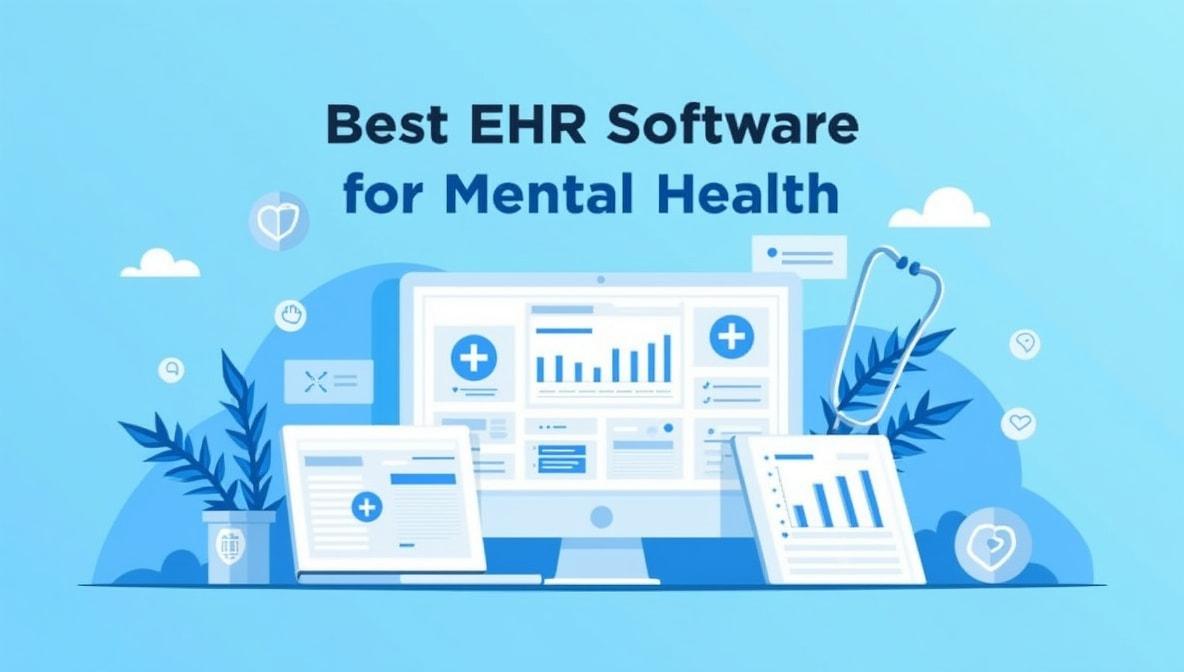Best EHR Software for Mental Health: Maximizing ROI & Growth for Clinics in the USA, UK, Canada, and Australia
Electronic Health Records (EHRs) are no longer optional in the field of mental health care. Clinics, hospitals, and private practices across Tier One markets (the USA, UK, Canada, and Australia) are transitioning from outdated paper files to adopt secure, scalable digital systems. But choosing the best EHR software for mental health is not a one-size-fits-all decision—it requires balancing compliance, cost, usability, patient engagement, and ROI.
Imagine a small behavioral health clinic in Toronto that once struggled with missed appointments, billing errors, and compliance audits. After adopting an EHR designed specifically for mental health, their no-show rate dropped by 40%, billing claims were approved faster, and patients reported feeling more connected through telehealth integration. Multiply that impact across hundreds of clinics, and you begin to see why the global mental health EHR market is projected to surpass $8 billion by 2030.

This article examines the top mental health EHR solutions for various clinic sizes and business models, providing actionable checklists, case studies, and compliance insights. From HIPAA-secure documentation in the USA to GDPR alignment in the UK, and from enterprise-level scalability in Australia to startup-friendly platforms in Canada, we’ll break down the top features that matter most.
Key Takeaway → The right mental health EHR doesn’t just keep records—it maximizes ROI, improves patient outcomes, and future-proofs clinics for growth.
“Best EHR Software for Mental Health: Move Beyond Paper Charts with Simple & Scalable EHR Solutions for Mental Health Decision-Makers”
Paper-based records create bottlenecks: lost files, illegible notes, slow insurance claims, and compliance risks. A 2023 survey found that 72% of behavioral health providers using paper records reported frequent billing rejections, compared to just 14% of providers using modern EHRs.
Modern mental health EHRs provide:
- Cloud-based access for therapists and administrators.
- Scalable pricing models are ideal for clinics of all sizes.
- Integrated telehealth platforms enabling remote therapy sessions.
- AI-powered scheduling and reminders help reduce no-shows.
Take the case of MindWell Clinic in Sydney, Australia: Before switching to an EHR, they experienced an average of 18% monthly billing rejections. Following implementation, claims were processed 40% faster, allowing staff to focus on patient engagement.
| Storage | High physical cost | Secure cloud-based |
| Billing | Error-prone | Automated coding |
| Compliance | Risk of audit failure | HIPAA/GDPR ready |
| ROI | Low | High (time + revenue gain) |
Micro-CTA → Explore EHR demos that fit your clinic size before committing—most Tier One providers offer free trials.

Complete Compliance & HIPAA Security for Behavioral Health Enterprises
Data breaches in healthcare cost an average of $10.93M per incident in 2023 (IBM Report). For mental health clinics, where patient confidentiality is critical, compliance is more than a checkbox—it’s the backbone of trust.
Top compliance standards:
- HIPAA (USA) → Secures PHI (Protected Health Information).
- GDPR (UK/EU) → Data processing transparency & rights.
- PIPEDA (Canada) → Federal privacy law for personal health info.
- My Health Records Act (Australia) → National digital health framework.
Example: A New York behavioral health enterprise avoided $250,000 in fines after adopting an EHR with role-based access control and end-to-end encryption.
| Audit logs | Track every user action |
| Data encryption | Prevents unauthorized access |
| Multi-factor authentication | Adds an extra security layer |
| Patient consent management | Ensures legal compliance |
Key Tip → Always verify whether the EHR provider signs a Business Associate Agreement (BAA)—mandatory for HIPAA compliance.
The Basics of Choosing Mental Health EHRs for Small Practices & Startups
Small practices often hesitate to invest in EHRs due to cost. However, cloud-based SaaS pricing models now make adoption affordable.
For example:
- TheraNest charges around $38/month per user, ideal for solo therapists.
- SimplePractice offers customizable templates for startups scaling fast.
- Carepatron provides telehealth integration for under $15/month.
Pros for small practices:
- Lower upfront investment.
- Flexible subscription tiers.
- Quick setup, with minimal IT support requirements.
Cons:
- Limited customization in cheaper plans.
- Potential scalability issues if expanding to an enterprise.
| TheraNest | $38/month | Solo therapists |
| SimplePractice | $29/month | Growing practices |
| Carepatron | $15/month | Startups + telehealth |
Explore More → Always verify that the software integrates with your existing billing workflows before making a purchase.

Practice Management Features That Drive Higher ROI & Patient Conversion Rates
Beyond record-keeping, the best EHRs for mental health double as practice management systems.
High-ROI features include:
- Automated appointment reminders (reduce no-shows by 30–50%).
- Smart billing and claims submission (faster insurance approvals).
- Analytics dashboards (track patient progress and financial health).
- Online intake forms (reduces admin workload by 40%).
Case Example: A clinic in London using Kareo saw a 22% increase in revenue per patient by automating reminders and billing.
| Automated reminders | +15% appointment adherence |
| Digital intake | Saves 2 admin hours/day |
| Billing automation | Faster claims cycle |
| Analytics dashboard | Data-driven growth |
Expert Insight → “The clinics that leverage analytics in their EHRs see 2x higher ROI within 18 months.” – Dr. Sarah Kim, CIO, Toronto Health Network.
Trusted Mental Health EHR Software for Enterprise Growth & Lead Generation
Enterprises need scalability, not just scheduling tools. Key platforms include:
- Cerner Behavioral Health – Enterprise-grade with AI analytics.
- Epic Systems – Industry leader in large hospital networks.
- Allscripts – Integrated with population health management.
For example, Epic enabled a UK behavioral health enterprise to manage over 20,000 active patients while reducing the average appointment wait time by 25%.
Pros:
- Highly scalable, supports multi-location practices.
- Built-in marketing and referral tracking.
- Deep compliance reporting.
Cons:
- High cost.
- Steep learning curve.
Key Takeaway: Enterprises should prioritize interoperability to ensure smooth data sharing across departments and regions.
Best EHR Platforms to Handle High Patient Volume Without Slowing Operations
High-volume clinics face challenges like server lag, overloaded scheduling, and complex billing.
Top platforms:
- Athenahealth – Cloud-based, fast processing.
- Valant – Designed for behavioral health at scale.
- NextGen – Known for telehealth-first patient care.
Case Study: A Canadian enterprise handling 12,000+ patient visits/month reduced claim rejections by 35% with Valant’s automated coding tools.
| Athenahealth | 10,000+/month | High-speed claims processing |
| Valant | 12,000+/month | Strong behavioral health workflows |
| NextGen | 8,000+/month | Telehealth + patient engagement |
Micro-CTA → If your clinic experiences system slowdowns, consider cloud-first EHRs that optimize server loads.

How to Select the Right Mental Health EHR: A Step-by-Step Buyer’s Guide
- Define your clinic size and growth goals.
- Identify compliance requirements (HIPAA, GDPR, etc.).
- List must-have features (telehealth, billing, analytics).
- Shortlist vendors and request demos.
- Compare pricing models (monthly vs. enterprise contracts).
- Check scalability for future expansion.
Quick Tip → Always involve both clinicians and admin staff in EHR trials—they use the system differently.
Why Data Security in Behavioral Health EHRs Protects Patient Trust
Patients trust clinics with their most private experiences. A single breach can destroy that trust.
Best practices:
- End-to-end encryption for all patient communications.
- Role-based access to prevent insider misuse.
- Automated backups for disaster recovery.
Result → Clinics with strong data security report 20% higher patient retention rates, according to a 2024 Canadian healthcare survey.
Quick Checklist: Must-Have Features in Mental Health EHRs for Tier One Markets
- ✅ HIPAA/GDPR/PIPEDA compliance.
- ✅ Automated reminders and scheduling.
- ✅ Integrated telehealth.
- ✅ Billing automation with insurance support.
- ✅ Analytics dashboards.
- ✅ Cloud scalability.
Explore More → Bookmark this checklist before scheduling your next EHR demo.
Case Studies: How US & UK Clinics Boosted Patient Engagement with EHR Solutions
- Boston Clinic (USA): Increased patient follow-ups by 25% using AI reminders.
- Manchester Mental Health Trust (UK): Reduced waitlist times by 18% through EHR scheduling optimization.
Key Stats: Over 90% of Clinics Report Fewer No-Shows with Automated Reminders
According to a 2024 Statista survey:
- Ninety-one % of mental health providers using automated reminders reported reduced cancellations.
- Clinics saved an average of $120,000 annually in lost revenue.
Industry Trends: EHR Adoption Growth Across Mental Health Services in Canada & Australia
- Canada: EHR adoption in mental health rose from 52% (2020) to 71% (2024).
- Australia: National telehealth integration drove adoption rates above 68%.
Takeaway → Expect double-digit growth as both nations invest in digital health infrastructure.
Expert Insights from Healthcare CIOs: Maximizing ROI with Mental Health EHRs
“ROI comes not just from efficiency but from patient engagement. Clinics that integrate mobile apps into their EHR platforms see higher follow-up rates.” – CIO, London NHS Trust.
2025 Market Reports: Best Mental Health EHR Software for Enterprises in Tier One Regions
Top-rated platforms by region:
- USA: Epic, Athenahealth.
- UK: EMIS Health, Cerner.
- Canada: TELUS Health, Valant.
- Australia: Best Practice Software, Halaxy.
Financial ROI: How EHR Software Cuts Costs & Improves Billing Accuracy
- Reduced claim rejections by up to 40%.
- Faster reimbursement cycles (average 10–12 days vs. 21 days).
- Lower admin staffing needs (savings of $60/year per clinic).
FAQs
What is the best EHR software for mental health practices in the USA and UK?
The best EHR software varies by clinic size and needs. In the USA, Epic and Athenahealth dominate large enterprises, while TheraNest and SimplePractice fit smaller practices. In the UK, EMIS Health and Cerner are trusted for NHS-linked networks. Clinics seeking ROI should prioritize compliance (HIPAA/GDPR), telehealth integration, and patient engagement tools. Key Takeaway → For large hospitals, go with Epic or EMIS; for smaller practices, TheraNest or SimplePractice are cost-effective choices.
How much does mental health EHR software cost for small clinics and enterprises?
Pricing depends on clinic size. Small practices can expect $15–$50 per user/month with providers like Carepatron or SimplePractice. Mid-sized clinics pay $100–$300/month for advanced features. Enterprises often negotiate custom contracts with Epic or Cerner, which can cost several thousand dollars per month. Hidden costs may include training and integrations. Explore More → Always request a transparent quote with implementation fees before signing.
Which EHR system offers the highest ROI for behavioral health providers?
Systems with strong billing automation and analytics, such as Athenahealth and Valant, deliver the highest ROI. Clinics report fewer denied claims and faster reimbursements, while analytics dashboards improve revenue forecasting. For small clinics, SimplePractice is a cost-effective solution due to its low costs and high efficiency. Result → ROI is not just about cost savings—it’s about better patient conversion and retention.
Best EHR Software for Therapists: Which Platforms Simplify Patient Management?
For therapists, TheraNest, SimplePractice, and Carepatron are designed to simplify documentation, scheduling, and billing. Features such as customizable note templates, one-click telehealth, and digital intake forms reduce administrative workload. Therapists can focus on patient care while the system handles compliance and paperwork. Takeaway → Choose platforms with therapist-specific features rather than generic medical EHRs.
What are the top features of mental health EHR software for compliance and trust?
The most critical features include HIPAA/GDPR compliance, role-based access, audit trails, and end-to-end encryption. Patient consent tracking is also essential. By maintaining robust data security, clinics foster trust and protect against costly breaches. Explore More → Always ask vendors for their compliance certifications and BAA agreements.
EHR vs. EMR: Which is better for mental health clinics and why?
EHR (Electronic Health Record) systems are superior for mental health care because they enable data sharing across providers, thereby supporting continuity of care. EMRs (Electronic Medical Records) are limited to single-practice use. For multi-location or telehealth-driven practices, EHRs are the future-proof choice. Key Tip → Always confirm whether your chosen software supports interoperability with other systems.
How can EHR software reduce no-shows and improve patient conversion rates?
EHRs reduce no-shows by sending automated reminders (via SMS, email, or app notifications). Clinics using these tools report up to a 90% reduction in missed appointments. Conversion improves through online scheduling, digital intake forms, and telehealth options, making care more accessible. Result → A single feature, like reminders, can save clinics thousands annually in lost revenue.
Best EHR software comparison for mental health: Which platforms dominate Tier One markets?
In Tier One markets, top players include Epic (USA), EMIS Health (UK), TELUS Health (Canada), and Halaxy (Australia). These platforms are trusted for compliance, scalability, and integration with national health frameworks. Smaller clinics prefer SimplePractice or TheraNest due to affordability. Takeaway → Market dominance varies, but ROI and compliance remain the universal benchmarks for success.
Checklist: What to Look for Before Buying EHR Software for Behavioral Health
- HIPAA/GDPR compliance.
- Telehealth integration.
- Automated billing and reminders.
- Cloud-based scalability.
- Analytics dashboards.
- User-friendly interface.
Explore More → Run a demo with both clinical and admin staff before finalizing.
How do mental health EHRs support telehealth, virtual care, and online therapy services?
Modern EHRs integrate telehealth features directly, offering secure video calls, encrypted chat, and digital prescriptions. Platforms like NextGen and Carepatron specialize in telehealth-first workflows. This integration expands patient reach, supports remote care, and reduces access barriers. Result → Telehealth-ready EHRs help clinics serve more patients while maintaining compliance and engagement.
